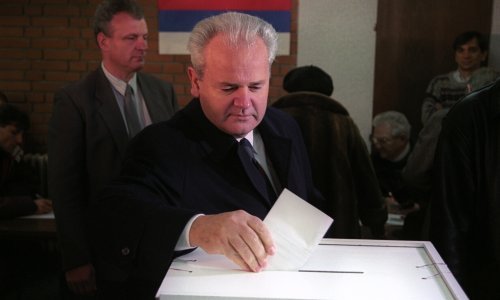The trial of the wartime Croatian Serb rebel leader Goran Hadzic, charged with persecutions on political, racial or religious grounds and with forcible transfer of thousands of Croatians and extermination and murder of hundred of them from June 1991 to the end of 1993, commenced before the International Criminal Tribunal for the former Yugoslavia (ICTY) in The Hague on Tuesday.
Hadzic, 54, who was the President of the Government of the self-proclaimed Serbian Autonomous District Slavonia, Baranja and Western Srijem and subsequently President of the Republic of Serbian Krajina (RSK), is charged with 14 counts. He is accused of having been a member of a joint criminal enterprise led by the then Serbian strongman Slobodan Milosevic, the aim of which was to forcibly and permanently remove Croatians and other non-Serbs from a third of Croatia's territory which Serb rebels occupied with the help of Belgrade after Croatia declared independence.
In his opening speech, Prosecutor Douglas Stringer said that this would be the last trial before the Hague-based UN tribunal and that the crimes cited in the Hadzic indictment referred to atrocities in eastern Slavonia, Croatia, the first war crimes committed in the former Yugoslavia. The prosecutor said that Hadzic failed not only to protect non-Serbs but he also approved of crimes committed against them.
Stringer pointed out the cases of Lovas, Erdut, Ilok and Tovarnik where Hadzic's followers carried out lawlessness and brutality in the summer and the autumn of 199.
The prosecutor spoke of Lovas where on 18 October 1991 50 captured Croats had been forced to walk into a mine-filed and were exposed to the fire from firearms.
Then 21 Croats were killed and many more were wounded, the prosecutor said, adding that the offices of the defendant Hadzic were at the same place where was the centre for training of troops under the command of the notorious Serbian criminal Zeljko Raznatovic also known as Arkan.
According to the prosecutor, the Yugoslav People's Army (JNA) organised a convoy for the departure of the easternmost Croatian town of Ilok and he also pointed out atrocities committed in Erdut.
The aim of all those crimes was to create within Croatia a territory alongside strictly national lines. The creation of ethnically clean areas was connected with violence, crimes and persecutions, which later became known as ethnic cleansing, the prosecutor said
Hadzic, 54, was arrested in Serbia on 20 July 2011 after being on the run for years. He was transferred to the UN tribunal in The Hague two days later. At the arraignment hearing he pleaded not guilty.
The prosecution plans to call a total of 85 witnesses, and some of them will testify in the tribunal and some of them will provide their written statements.
The three-member trial chamber is chaired by Belgian Judge Guy Delvoie, and the other two members are Burton Hall of the Bahamas and Antoana Mindua of Congo.
Hadzic's defence team consists of Belgrade lawyer Zoran Zivkovic and Canadian lawyer Christopher Gosnell.
The ICTY issued its first indictment against Hadzic in June 2004, and amended it in July 2012. The second amended indictment was issued in March 2012.
Upon the release of the initial indictment, Hadzic went into hiding, and was arrested in Fruska Gora, Serbia on 20 July 2011.
Hadzic, who used to be a warehouseman in eastern Croatia, was also sentenced to 20 years in prison in absentia by Croatian courts for war crimes.
He is the last indictee out of 162 persons indicted for war crimes by the ICTY.

































